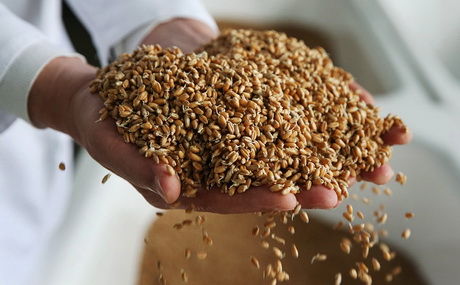Experimental plants for the production of ingredients for toothpaste, hyaluronic acid, bioplastics from grain are being opened in Russia. We are growing more and more of it. But now we export it in its "raw" form at the same price, and we buy it in its processed form - vitamins or amino acids - already at a high price. The production of such products within the country will help to get rid of import dependence, create thousands of jobs, earn many times more on exports and, as a result, reduce the prices of products for consumers.
One of such plants for deep processing of grain opened in the summer of 2019 in the Kaluga region. Rosva Biotechnological Complex processes wheat into glucose-fructose syrups, crystalline glucose, starch, feed mixtures, gluten and sorbitol, without which the production of toothpaste and chewing gum cannot do. Another company, Oka-Biotech, has so far produced only an experimental batch of hyaluronic acid from grain and now intends to build a serious industrial production. Now both sorbitol and hyaluronic acid are fully supplied to Russia from abroad. The global market volume of hyaluronic acid, according to various estimates, is several hundred tons per year. According to iMars Group, the global production of sorbitol is more than 2.5 million tons. The Russian sorbitol market is 400 thousand tons (or $ 35 million), estimates Vladimir Shaforostov, partner of NEO Center.
There are more understandable projects for deep grain processing that have been working for several years, but have already partially or completely freed us from import dependence on several important products. For example, the Gulkevichsky starch factory (Krasnodar Krai) produces maltodextrin (molasses). The volume of the Russian maltodextrin market now amounts to $ 34-35 million, Shaforostov estimates.
Belgorod "Premix Plant N1" produces the amino acid lysine, which is indispensable for animal husbandry. Previously, it was completely imported from China and Europe. With the weakening of the ruble, it has become an expensive pleasure to carry this amino acid from abroad. According to Feedinfo, lysine prices at the beginning of the year were the highest in the last eight years. Russian production in 2020 is estimated at 100-110 thousand tons (or about 170 million dollars), while imports at the end of last year amounted to about 50 thousand tons, says Vladimir Shaforostov.
Grain bioplastics are not yet produced in Russia, although some large petrochemical companies have developed such projects. From the economic point of view, they are risky — large investments are needed. In the summer of 2019, the construction of the Rustark complex began in the Lipetsk SEZ. It is assumed that at first it will produce modified starch, and at the next stage — bioplastics.
A source: //upakovano.ru/news/553758

